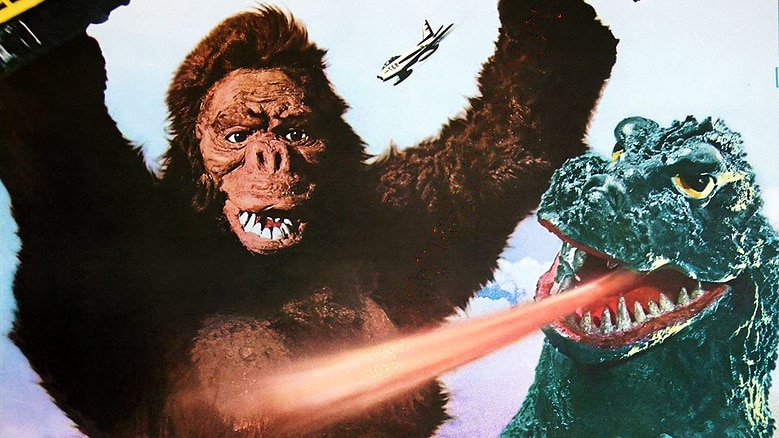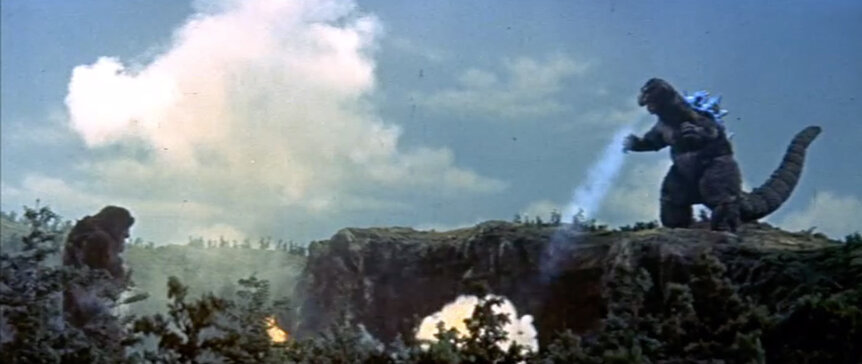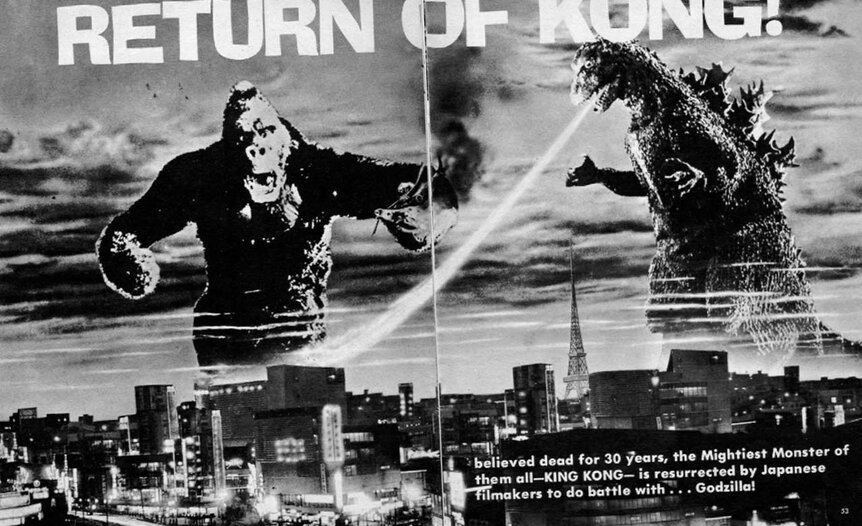Create a free profile to get unlimited access to exclusive videos, sweepstakes, and more!
The truth of the kaiju-sized urban legend about King Kong vs. Godzilla's ending

For years, King Kong vs. Godzilla (1962) was the subject of one of the most endearing urban legends in the study of science fiction cinema. American genre fans spent decades believing that the movie had two distinct endings, and that the winner of the film's eponymous battle depended on which one you saw. In the original Japanese ending, supposedly, Godzilla won; in the heavily re-edited American version produced by John Beck (the cut most U.S. fans are familiar with and the only one commercially available in North America for the longest time), Kong came out on top.
The Japanese version of King Kong vs. Godzilla has historically been barred from release in the U.S. due to peculiar legal roadblocks, so it was perhaps rather easy, in the days before the internet, to accept this undeniably flavorful story at face value. However, thanks to the efforts of resourceful fans, the truth is now pretty well known: Disappointing though it may be for some, the Japanese version of King Kong vs. Godzilla has fundamentally the same ending as its American counterpart. In both finales, Godzilla and Kong are locked in a furious battle; they smash Atami Castle before tumbling off a cliff into the ocean; an undersea earthquake churns the water where the two behemoths vanished; Kong rises to the surface and swims away; Godzilla is nowhere to be seen. The end.
Although there was ultimately no truth to it, the "double ending" still makes for a tantalizing conversation piece. (Who doesn't like the idea of alternate endings to a battle between the two most famous movie monsters in history?) And since the original Japanese version of King Kong vs. Godzilla is at long last set to receive an official U.S. release this October (not to mention there's a new Hollywood film, Godzilla vs. Kong, coming out next March), it seems like a good time to try to discuss where this "double ending" myth came from in the first place. What metaphorical atomic bomb mutated this falsehood into a monstrous urban legend?
Most fans probably remember first reading about the "double ending" in Famous Monsters of Filmland magazine or Ian Thorne's notoriously error-infested Godzilla book from the late '70s. Others might also have seen that televised interview with Raymond Burr, in which host Bob Costas speculated the two endings happened "because the countries have rooting interest in their own particular monster." The story circulated for many years before being debunked in the 1990s, but its actual origin goes all the way back to 1963 (the year the film's American version came out) and a little publication called Spacemen.
Released by Warren Publishing and edited by the late Forrest J. Ackerman (the same team behind Famous Monsters of Filmland), Spacemen was a short-lived fan magazine that ran for eight issues and tackled topics such as Buck Rogers, Harryhausen movies, Japanese spectacles, and of course alien invasion pictures. Most notably, there was an article from their seventh issue, published on September 7, 1963, about a big-screen confrontation between two giant movie monsters from opposite sides of the world.
Opening with a two-page spread of behemoths towering over a city skyline, the article in Issue #7 of Spacemen declared that King Kong, "believed dead for 30 years," had returned to cinema screens. ("King Kong is back & don't ask how because nobody knows," the article proclaims, implying that the Kong in this movie is the same Kong who was gunned down at the Empire State Building in 1933, though the great ape in the Godzilla series is clearly a different beast.) Then comes clarification that Kong's latest outing is an international project called King Kong vs. Godzilla, followed by a recounting of the film's plot. Inevitably, the synopsis shifts to Kong and Godzilla's climactic battle on the slopes of Mt. Fuji, "where they can really throw their weight (a combined 99 million pounds) around."
Then comes the following:
"Does King Kong best his saurian adversary or does Godzilla prevail over the mammoth ape? SPACEMEN lets you in on a secret: 2 endings have been filmed & if you see KING KONG vs. GODZILLA in Japan, Hong Kong, or some Oriental sector of the world, Godzilla wins! On the other hand, in the USA & England, for instance, Kong wins!"
And thus an urban legend was born.
The article in question does not provide a source for this "revelation," but the stage had effectively been set for it to one day spread like wildfire. Because Spacemen was a companion magazine to Famous Monsters of Filmland, it was a simple enough process to repurpose content in other magazines from Warren Publishing — which is precisely what happened. The "double ending" yarn subsequently appeared in Issue #51 of Famous Monsters and then again in the 114th issue of that same publication. Appearances in such a beloved genre magazine meant it would only grow from there and filter into other outlets.
That error-ridden Ian Thorne book repeated the story, as did mainstream publications like the Los Angeles Times (a columnist, likely seeking attention, claimed to have seen the "Godzilla wins" ending on television in his Tokyo hotel room). There was also the "Genus III" edition of the board game Trivial Pursuit wherein "Godzilla" was the 'correct' answer to the question 'Who won the Japanese version of King Kong vs. Godzilla?' Through all of this, the dual endings to King Kong vs. Godzilla attained status as a "fun fact" in 20th-century pop culture. (Though people seemed content to omit Spacemen's claim that the "Godzilla wins ending" was also shown in Hong Kong and other parts of Asia.)
Of course, knowledgeable fans eventually set the record straight — or at least attempted to. During the 1990s, publications such as Markalite magazine, Ed Godziszewski's The Illustrated Encyclopedia of Godzilla, and Steve Ryfle's book Japan's Favorite Mon-Star: The Unauthorized Biography of "The Big G" clarified that that Japanese version did not, in fact, conclude with definitive victory for Godzilla. Not to mention that the arrival of the internet meant there were now much simpler ways for fans to acquire Japanese home releases of King Kong vs. Godzilla and see for themselves that even in director Ishiro Honda's original cut, only Kong rises to the surface at the end. And, once the Criterion Collection of the first series of Godzilla films comes out in late October, Western fans will finally be able to watch the original Japanese version to the very end.
But whether King Kong or Godzilla will emerge victorious in next year's rematch remains to be seen.




























